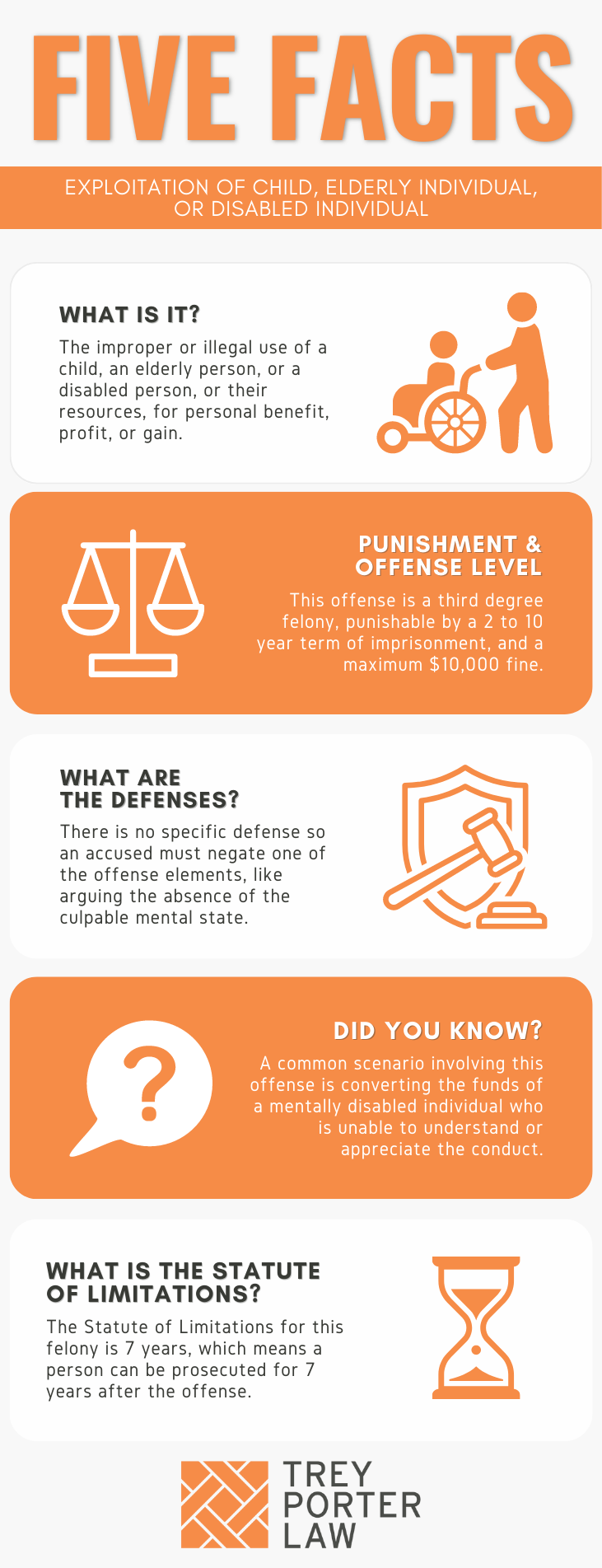WHAT IS EXPLOITATION OF CHILD, ELDERLY INDIVIDUAL, OR DISABLED INDIVIDUAL IN TEXAS?
The Texas law against exploitation of a child, elderly individual, or disabled individual prohibits using the financial resources of a child, elderly, or disabled person, or otherwise improperly using one of those individuals for monetary or personal gain.

WHAT IS THE EXPLOITATION OF CHILD, ELDERLY INDIVIDUAL, OR DISABLED INDIVIDUAL LAW IN TEXAS?
Tex. Penal Code § 32.53. EXPLOITATION OF CHILD, ELDERLY INDIVIDUAL, OR DISABLED INDIVIDUAL.
(b) A person commits an offense if the person intentionally, knowingly, or recklessly causes the exploitation of a child, elderly individual, or disabled individual.
(c) An offense under this section is a felony of the third degree.
(d) A person who is subject to prosecution under both this section and another section of this code may be prosecuted under either or both sections. Section 3.04 does not apply to criminal episodes prosecuted under both this section and another section of this code. If a criminal episode is prosecuted under both this section and another section of this code and sentences are assessed for convictions under both sections, the sentences shall run concurrently.
(e) With the consent of the appropriate local county or district attorney, the attorney general has concurrent jurisdiction with that consenting local prosecutor to prosecute an offense under this section that involves the Medicaid program.
WHAT IS THE PENALTY CLASS FOR EXPLOITATION OF CHILD, ELDERLY INDIVIDUAL, OR DISABLED INDIVIDUAL IN TEXAS?
Exploitation of a child, elderly individual, or disabled individual is a third degree felony, punishable by two to ten years in prison, and a maximum $10,000 fine.
WHAT IS THE PUNISHMENT RANGE FOR EXPLOITATION OF CHILD, ELDERLY INDIVIDUAL, OR DISABLED INDIVIDUAL IN TEXAS?
The punishment range for exploitation of a child, elderly individual, or disabled individual, a third degree felony, is two to ten years in prison, and a maximum $10,000 fine.
WHAT ARE THE PENALTIES FOR EXPLOITATION OF CHILD, ELDERLY INDIVIDUAL, OR DISABLED INDIVIDUAL IN TEXAS?
A person charged with exploitation of a child, elderly individual, or disabled individual may be eligible for probation after a conviction, or deferred adjudication without a conviction, for a period between two and five years.
WHAT ARE THE DEFENSES TO EXPLOITATION OF CHILD, ELDERLY INDIVIDUAL, OR DISABLED INDIVIDUAL IN TEXAS?
The statute does not authorize specific defenses to exploitation of a child, elderly individual, or disabled individual. A person accused thereof may attempt to negate at least one of the elements the State must prove at trial. For example, a person may argue he or she lacked the requisite mental state to exploit a child, elderly person, or disabled person.
- In Erwin v. State, the defendant asked her grandmother, the alleged victim, if she could deposit her friend’s paycheck into the victim’s account in exchange for a cash withdrawal. The friend’s paycheck ultimately bounced after the money had been withdrawn.The victim and another witness testified the defendant, in their opinion, did not know her friend’s check would bounce. The jury convicted the defendant of exploiting her elderly grandmother, but the appellate court reversed. The evidence was insufficient to establish the defendant had the intent to exploit her grandmother.
WHAT IS THE STATUTE OF LIMITATIONS FOR EXPLOITATION OF CHILD, ELDERLY INDIVIDUAL, OR DISABLED INDIVIDUAL IN TEXAS?
The limitation period for exploitation of a child, elderly individual, or disabled individual, a third degree felony, is seven years.
EXPLOITATION OF CHILD, ELDERLY INDIVIDUAL, OR DISABLED INDIVIDUAL IN TEXAS
Exploitation of a child, elderly individual, or disabled individual is the intentional, knowing, or reckless illegal or improper use of one of those protected individuals who cannot protect themselves from financial predators.
TEXAS EXPLOITATION OF CHILD, ELDERLY INDIVIDUAL, OR DISABLED INDIVIDUAL COURT CASES
The case law regarding exploitation of a child, elderly individual, or disabled individual in Texas demonstrates the high level of protection given to the members of society who are typically unable to protect themselves against fraud.
- In Paroline v. State, the victim was in his mid-thirties, living with his parents, and worked one to two hours a day at Dairy Queen. He was diagnosed with mental retardation and autism at age nine. The defendant, with whom he had a sexual relationship, took his debit card and made several purchases and cash withdrawals without permission. She was convicted of exploitation of a disabled individual, and the appellate court affirmed.To show that an individual is disabled, it is sufficient to show that because of age or physical or mental disease, defect, or injury, he is substantially unable to protect himself from harm.
- In Vidakovic v. State, the elderly victim had written checks over the course of two years to the defendant, his neighbor, totaling over $41,000. The victim had Alzheimer’s and dementia, and the evidence showed the defendant talked him into funding business ventures as a “loan,” but had not paid him back as promised. The defendant was convicted of exploitation of an elderly individual, and the appellate court affirmed.
















